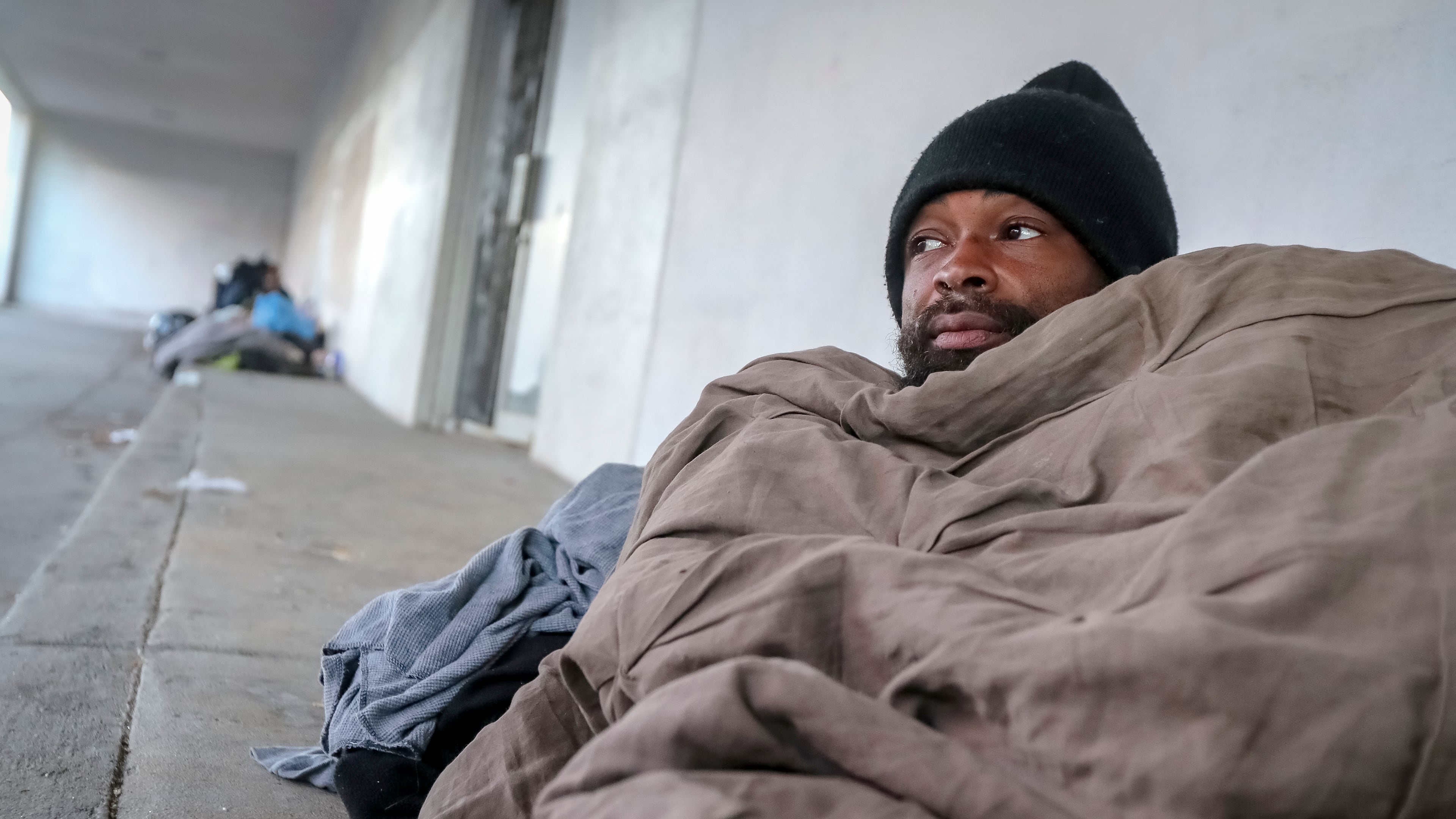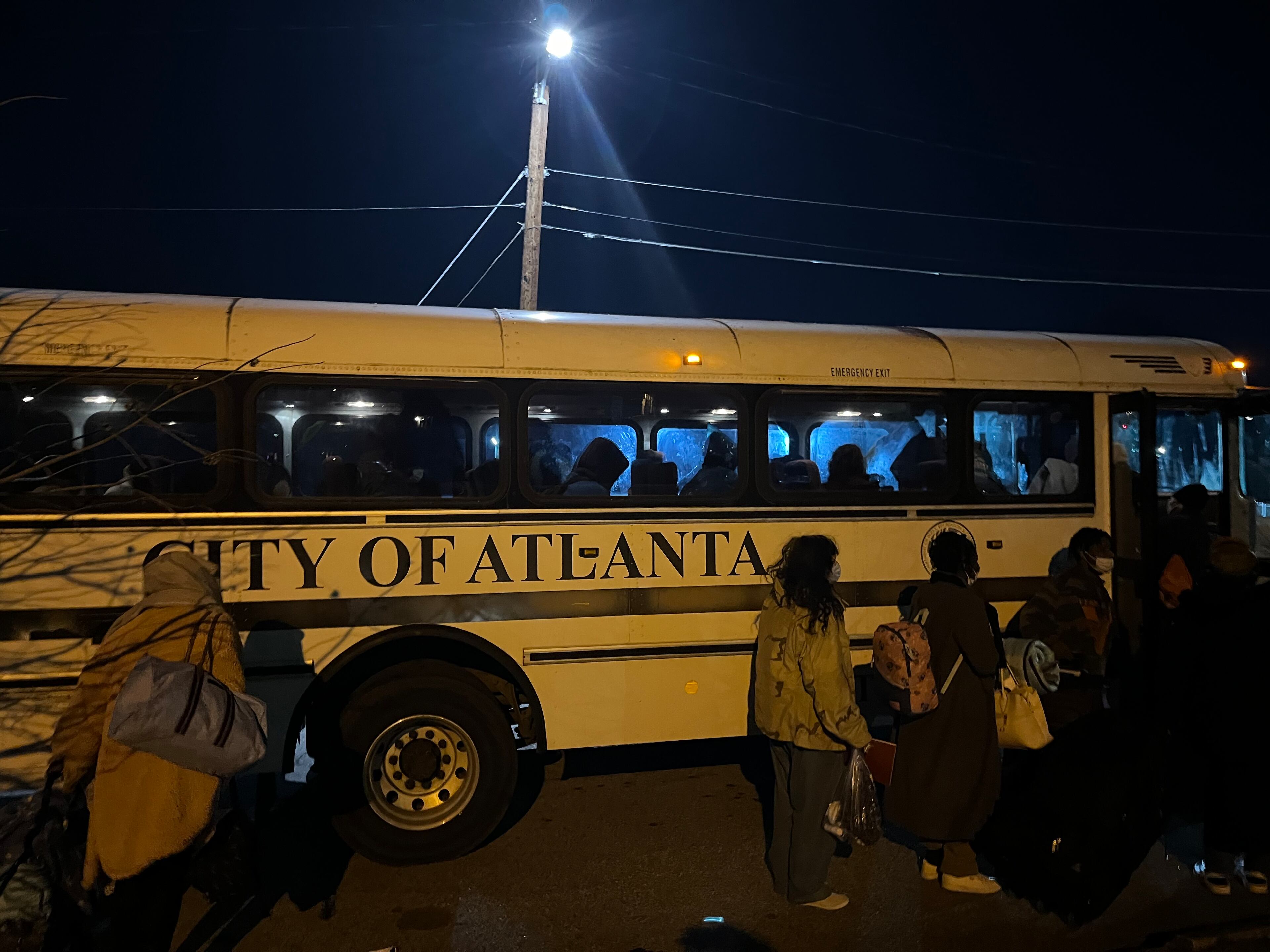For some homeless Atlantans, a long, winding path out of cold

(Editor’s note: This article was updated Thursday with new details.)
Lena Harris and her five children — ages 1 to 10 years old — climbed onto another bus Wednesday afternoon, making another trek to yet another short-term shelter from the cold. She was wearing her warmest jacket: a thin fleece. Her kids’ coats looked somewhat warmer.
“My life wasn’t like this a year ago,” the 38-year-old mom said.
“I’m not a bum. I actively have things going on for myself, but we are in a bad situation right now. When one thing crumbles it is like a domino effect. It crumbles really fast.”
Just 17 hours earlier she and the kids had stood briefly in the night’s bitter chill waiting to get on a different bus. In line with her were dozens of other homeless women, a few of them mothers with young children, all part of the overflow from the main warming center the city of Atlanta opened in a recreation center as temperatures sank in recent days.
There weren’t enough cots for the more than 100 people, most of them men, who sought refuge in the one big gym on Tuesday night. So some people were given plastic chairs to sit in. Around 9:30 p.m., women and children were loaded onto a bus to travel a mile and a half to another recreation center city officials rushed to turn into a warming center. There, some of the newcomers said, dozens of women were given access to a single toilet, which soon ran short of toilet paper. But they said the place was clean and warm, and they were provided food.

Around metro Atlanta, this week’s cold snap has increased the pressure on local governments to help out. Temperatures climbed slightly Thursday, but are expected to fall back into the teens on Friday and Saturday.
The city of Atlanta announced Thursday that it would keep its two warming stations open at least until Monday morning. Early Thursday, a total of 171 people were staying at the sites. Volunteers and nonprofits dropped off clothing and other donations, including the Black Male Initiative Fund, which handed out backpacks, each stuffed with supplies.
Warming centers also have opened this week from Gwinnett to Clayton, Rockdale and Henry counties and elsewhere.
Clayton County opened eight warming centers, only two of them operating at night, and recently extended their operation through midday Saturday. The daytime centers had no guests early in the week, but added a couple recently. Jamie Carlington, a Clayton crisis communications officer, said about 20 people have sought shelter from the weather at the police department.
Drew Andrews, an advocate for the homeless in Clayton, criticized the county for being slow to act, for initially planning to keep the centers open only a short time, and for not having set parameters for what kind of weather conditions should lead to centers being activated. Planning should include community input, he said. “This will help determine hours of operations and what locations were open to receive our unhoused community members, what agencies will be responsible for transporting, what organization will provide food etc.”
In Gwinnett County, 93 residents stayed in warming centers overnight Tuesday. In DeKalb County, more than 300 people stayed in government warming centers Tuesday and more than 200 were in centers by midday Wednesday. A spokesman said there weren’t issues in meeting the demand. The county and local nonprofits had been planning and coordinating weekly for warming centers since early September, with the centers activated nearly 40 times so far this season.
But the extra chill over an extended period added to challenges. On Wednesday, the city of Atlanta stationed a mobile unit of toilets outside its main warming station at Central Park, where residents were also offered showers and food in addition to places to sleep. Most of the cots appeared to be spoken for Thursday afternoon, as did spaces in the second warming center opened at Serena S. Butler Park.
Whenever the centers near capacity, officials assess where and when to open a new facility, while working with other shelter providers, city emergency preparedness manager Asher Morris wrote in an email Thursday.

The biting temperatures have added a dangerous wrinkle in what some homeless people describe as a life that is often a tenuous, day-to-day hunt for a little stability.
Dorothy Ray left an Atlanta overflow warming station after one night, frustrated, she said, by too many people using a single toilet, a lack of toilet paper and staffers she considered rude. She carried a bag and pushed her seven-month-old daughter, covered with blankets, in a stroller. Her 10-year-old son pulled the family’s only suitcase Wednesday.
“I make sure my kids don’t sleep outside,” she said. But that isn’t easy.
She said they moved into a shelter after coming to Atlanta from Houston two months ago. But she said they had to leave that space when her son got sick, and for a while they’ve been on a waiting list for a longer-term space. Now, she said, she often asks strangers for money — blessings she calls it — hoping to scrape together enough each day for a hotel stay. She said she wants a job, but the family’s situation and daily efforts to get a place to stay stand in the way.
Ray said if she couldn’t get in a shelter Wednesday, she would ask strangers again for hotel money. “We are going to make everything work ... As we always do.”

Others bring up different hurdles.
Harris said she worked regularly from home as a customer service representative and has been going to school online for a health care management degree. But she said she spent the family’s savings to help with the legal issues of her fiancé. She said she was evicted from her home and later lost access to her car. She said she’s been homeless since late 2022, often staying in hotel rooms when she can.
But their circumstances keep shifting, she said. “In the last month we have been in and out of emergency shelters.”
She recently used a portion of an early tax refund to pay for five days in a Motel 6. When she ran out of money for that stay, she and the kids took various transit connections to a shelter in Cobb County. It was out of regular bed space but allowed the family to spend the night on the lobby floor, she said. Then they spent a night with a cousin at a place where he was house sitting. The next day he dropped them off at a train station so they could go to another shelter, which turned out to be full. But there she learned about the city of Atlanta’s warming center.
By Wednesday afternoon, the family was on the move again. This time to a local Salvation Army center. She said she didn’t know how long they’d be allowed to stay there. That, she said, was good news. Another step toward stability is in the works, she said: Next week she is supposed to start a job as a computer technician.
But by midday Thursday she was on the hunt for another place to stay. She said the family had been kicked out after a staffer complained about her kids running around inside and Harris spoke out against what she viewed as ongoing belittling comments. A spokeswoman for the Salvation Army’s local unit wrote in an email that Harris had refused to follow safety rules and regulations instituted to protect everyone in the facility.
Meanwhile, with more frigid nights ahead, staffers and volunteers with area nonprofits visit homeless encampments, offering people rides to warming stations.
Tracy Woodard of the nonprofit Intown Cares tried to see her way through a tangle of south Atlanta woods on Tuesday night, holding her cellphone in the air with its flashlight on. “Anyone home? Social worker, just checking on folks,” she called out near one shelter.
If people were inside, they didn’t respond. Woodard drove to different spots where she had helped people before. Some people slowly made their way out of shelters when she called to them. But of the several she visited, none took her up on a ride to a shelter.
They mentioned reasons.
A 34-year-old man said he hoped to be able to spend the night in a friend’s nearby apartment. A 55-year-old woman living in a beaten-down van stuffed with clothes and blankets said she’s been able to stay warm thanks to a heater tied to an extension cord running to a nearby house where a relative used to live. Another woman, this one 27 years old and living in a tent in the driveway of a burned-out house, said she and her boyfriend had once been to a warming center in Alabama and had been uncomfortable being around so many people, some of whom she thought had drug addictions or mental health issues.

In woods a mile or so away, a 62-year-old man with a headlamp and a deep cough said, “I have three dogs I have to take care of. I have responsibilities.” One was chained to a nearby tree.
In his sturdy-looking shelter, he said he relied on an ancient, military-issue, wood-burning stove. But the problem was a leak in the shelter’s roof. His clothes were wet. So were his only pair of shoes. “My toes are numb,” he said.
“What size are you?” Woodard asked. She promised to check the nonprofit’s donations closet to see if she had a pair in his size.
If a warm shelter wasn’t an option, a pair of dry, used shoes might be.
—Leon Stafford and Jillian Price contributed to this story.


